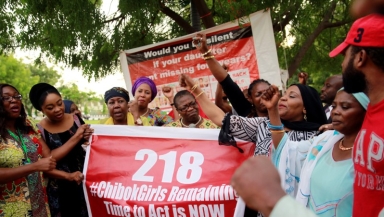More than 100 Chibok schoolgirls do not want to go home either because they have been radicalised or because of the stigma they will face as ex-Boko Haram captives.

The Nigerian government is currently negotiating the release of another 83 girls from the 276 kidnapped in April 2014. But many are ashamed to return, chairman of the Chibok Development Association Pogu Bitrus told the Associated Press.
His comments followed the first negotiated release last week where 21 girls were freed. The news was received with "delight, relief and optimism" by the Anglican Church of Nigeria. But Bitrus said the girls should be educated and cared for abroad in order to avoid further abuse in their own communities.
"We would prefer that they are taken away from the community and this country because the stigmatization is going to affect them for the rest of their lives," he said in a telephone interview. "Even someone believed to have been abused by Boko Haram would be seen in a bad light."
All those who have already escaped the terror group have left their home region after being labelled "Boko Haram wives" and mocked.
Nigeria must "stand strong" to "protect them from stigma, ostracization and rejection," the UN special rapporteurs on the sale of children said in a statement Tuesday. The comment was particularly directed at the small town of Chibok, a conservative Christian community in the Muslim-majority north of Nigeria.
The girls were split into two groups when first captured, according to their own testimony since being released. They were given the choice of embracing Islam and becoming saints.
Those already freed and those under negotiation are all from the second group who chose slavery. The girls told their parents they never saw those in the second group again, said Bitrus. The released girls were used as were used as domestic workers and porters but were reportedly not sexually abused.













